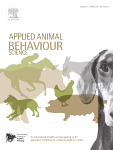Document type : online prepublication of scientific articl ein Applied Animal Behaviour Science
Authors: Kira J.Lowell, Mikel M.Delgado, Sabrina L.Mederos, Melissa J.Bain
Chaque chaton a été placé individuellement dans un enclos d’un mètre de diamètre à l’écart du reste de la portée et/ou de la mère pendant deux minutes. Le nombre d’appels émis et l’activité totale (en secondes) ont été enregistrés pour chaque chaton lors de chaque essai. Nous avons évalué les effets de l’âge, du sexe, du statut d’orphelin, et des interactions entre le statut d’orphelin avec le sexe et l’âge sur l’activité et les vocalisations. Les chatons orphelins étaient plus actifs que les chatons élevés par leur mère aux deux moments (t(46) = 4,62, p < 0,001), avec une interaction entre l’âge et le statut d’orphelin (t(28) = -2,84, p = 0,008). Les chatons orphelins ont émis plus de vocalisations aux deux moments (Z = 2,38, p = 0,018), avec une interaction entre l’âge et le statut d’orphelin (Z = -3,18, p = 0,001).
Preview: It is unknown how premature maternal separation affects the responses of kittens to potentially stressful events. In the United States, thousands of kittens are orphaned each year due to death of the queen, neglect, or accidental separation by humans. Neonatal mammals emit distress calls and increase locomotion when socially isolated, suggesting that being separated from the nest is a stressful event. Increased vocalization and activity of isolated neonates may aid maternal retrieval or relocation of the nest. In the current study, we assessed the effects of early maternal separation on later vocalizations and activity of 49 kittens (28 orphaned, 21 mother-reared; 23 female, 26 male) from 11 litters (5 mothered, 6 orphaned) during an open field test when the kittens were one and three weeks of age. We conducted a total of 79 trials.
Each kitten was placed individually in a 1-meter diameter pen away from the rest of the litter and/or mother for two minutes. The number of calls emitted and total activity (in seconds) were recorded for each kitten on every trial. We assessed the effects of age, sex, orphan status, and interactions between orphan status with sex and age on activity and vocalizations. Orphaned kittens were more active than mother-reared kittens at both times (t(46) = 4.62, p < 0.001), with an interaction between age and orphan status (t(28) = -2.84, p = 0.008). Orphaned kittens emitted more vocalizations at both times (Z = 2.38, p = 0.018), with an interaction between age and orphan status (Z = -3.18, p = 0.001).
Orphaned kittens showed increased activity and vocalizations in response to a brief nest separation compared to mother-reared kittens. This effect was still present after over two weeks of maternal separation, suggesting that maternal separation may lead to long-term changes in stress responses. Future research should explore if such effects of maternal separation are present in older kittens or adult cats.




